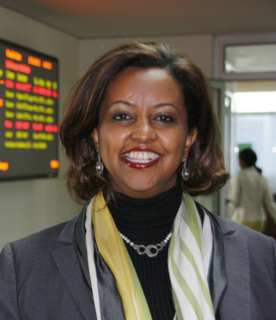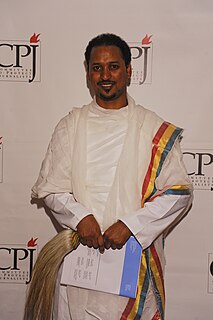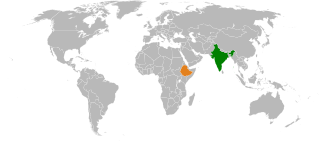
Extreme poverty, abject poverty, absolute poverty, destitution, or penury, was originally defined by the United Nations (UN) in 1995 as "a condition characterized by severe deprivation of basic human needs, including food, safe drinking water, sanitation facilities, health, shelter, education and information. It depends not only on income but also on access to services." In 2018, extreme poverty widely refers to an income below the international poverty line of $1.90 per day, set by the World Bank. This is the equivalent of $1.00 a day in 1996 US prices, hence the widely used expression "living on less than a dollar a day". The vast majority of those in extreme poverty — 96 percent — reside in South Asia, Sub-Saharan Africa, the West Indies, East Asia, and the Pacific; nearly half live in India and China alone. As of 2018, it is estimated that the country with the most people living in extreme poverty is Nigeria, at 86 million.

The government of Ethiopia is structured as a federal parliamentary republic with both a President and Prime Minister.

Hailemariam Desalegn Boshe is an Ethiopian politician who served as 14th Prime Minister of Ethiopia from 2012 to 2018. He also previously served as Deputy Prime Minister and Minister of Foreign Affairs under Prime Minister Meles Zenawi from 2010 to 2012. After Meles' death in August 2012, Hailemariam succeeded him as Prime Minister, initially in an acting capacity. He was then elected as the Chair of the Ethiopian People's Revolutionary Democratic Front (EPRDF), the ruling party, on 15 September 2012. Hailemariam also served as the Chairperson of the African Union from 2013 to 2014.
Azeb Mesfin Haile is the widow of Ethiopian Prime Minister Meles Zenawi. She is the founder and patron of Ethiopia's National Initiative for Mental Health. In early 2009, she was appointed CEO of the Endowment Fund for the Rehabilitation of Tigray by its head Abadi Zemu.
Bulcha Demeksa is an outspoken Ethiopian politician and businessman. He is the founder of the Oromo Federalist Democratic Movement (OFDM), one of Ethiopia's largest opposition parties.

Ethiopia–Ireland relations are foreign relations between Ethiopia and Ireland. Both countries established diplomatic relations in 1994, the same year Ireland opened an embassy in Addis Ababa. Ethiopia has an embassy in Dublin.

Ethiopia–Mexico relations refers to the diplomatic relations between Ethiopia and Mexico.
The Forum of Federations is an international organization based in Ottawa, Ontario, Canada. The Forum and its partners form a global network on federalism. It brings together elected officials, civil servants and experts in federalism from about 20 countries to learn from each other. The Forum's learning and technical assistance programs have covered the following countries: Argentina, Australia, Austria, Belgium, Brazil, Burma, Canada, Ethiopia, Germany, India, Italy, Kenya, Libya, Malaysia, Mexico, Nepal, Nigeria, Pakistan, Philippines, Russia, Spain, South Africa, Sri Lanka, Sudan, South Sudan, Switzerland, Tunisia and Yemen.

Eleni Zaude Gabre-Madhin is an Ethiopian economist with a swiss nationality and a former Chief Executive Officer of the Ethiopia Commodity Exchange (ECX). She has had many years of experience working on agricultural markets – particularly in Sub-Saharan Africa – and has held senior positions in the World Bank, the International Food Policy Research Institute (Washington), and United Nations (Geneva).
Tesfaye Dinka Yadessa was Minister of Finance (1983–1986), Minister of Foreign Affairs (1989–1991), and Prime Minister of Ethiopia. He was the head of the delegation of the Ethiopian Government during the London Conference of 1991 which aimed to end the Ethiopian Civil War.

Ethiopia–Japan relations are the international relations between Ethiopia and Japan. Both were nations with an ancient history which successfully repulsed European military advances to dominate them, Ethiopia at the Battle of Adwa, and Japan at the Battle of Tsushima, and as a result both nations considered each other potential allies prior to World War II.
United Nations Secretary-General Ban Ki-Moon established a High-Level Advisory Group on Climate Change Financing (AGF) on 12 February 2010 for the duration of ten months. The group's aim was to "study potential sources of revenue that will enable achievement of the level of climate change financing that was promised during the United Nations Climate Change Conference in Copenhagen in December 2009."

Elections for a Constituent Assembly were held in Ethiopia on 5 June 1994 in order to form a body to draw up a new constitution. They were the first elections after the overthrow of the Mengistu regime at the end of the Ethiopian Civil War in 1991, and the first ever multi-party elections in the country; previous elections had either been non-partisan or one-party. The results saw the Ethiopian People's Revolutionary Democratic Front and its allies win 463 of the 544 seats. Voter turnout was 87.5%.

Dawit Kebede, is an Ethiopian journalist and winner of the 2010 CPJ International Press Freedom Award.

The Transitional Government of Ethiopia (TGE) was established immediately after the Ethiopian People's Revolutionary Democratic Front (EPRDF) seized power from the Communist-led People's Democratic Republic of Ethiopia (PDRE) in 1991 and it continued until 1995, when it transitioned into the reconstituted Federal Democratic Republic of Ethiopia, which continues to this time. Meles Zenawi was the president and Tamrat Layne the prime minister of the Transitional Government.

The premiership of Meles Zenawi began on August 1995 following the 1995 Ethiopian general election and ended upon his death on 20 August 2012. Whilst serving as Prime Minister of Ethiopia, Meles Zenawi concurrently served as the Leader of the Tigray People's Liberation Front (TPLF) and Ethiopian People's Revolutionary Democratic Front (EPRDF).

India-Ethiopia relations are bilateral diplomatic relations between India and Ethiopia. It was in July 1948, India and Ethiopia first established diplomatic relations at the level of legations. The relationship was raised to ambassadorial level four years later in 1952. India maintains an embassy in Addis Ababa and Ethiopia in New Delhi. The two countries have enjoyed close and friendly relations with India supporting Ethiopian developmental efforts while Ethiopia has supported Indian interests such as its claim to a permanent seat on the United Nations Security Council. India and Ethiopia share a common understanding on such issues as cross-border international terrorism, the need and direction for reform of the United Nations, and the importance of action on climate change.
The following lists events that happened during 2007 in Ethiopia.
The following lists events that happened during 2003 in Ethiopia.


















